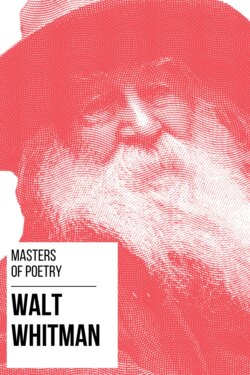Читать книгу Masters of Poetry - Walt Whitman - August Nemo, John Dos Passos, Ellen Glasgow - Страница 43
На сайте Литреса книга снята с продажи.
IV
ОглавлениеWhitman showed just enough intention, or premeditation in his life, dress, manners, attitudes in his pictures, self-portrayals in his poems, etc., to give rise to the charge that he was a poseur. He was a poseur in the sense, and to the extent, that any man is a poseur who tries to live up to a certain ideal and to realize it in his outward daily life. It is clear that he early formed the habit of self-contemplation and of standing apart and looking upon himself as another person. Hence his extraordinary self-knowledge, and, we may also say, his extraordinary self-appreciation, or to use his own words, "the quite changed attitude of the ego, the one chanting or talking, towards himself." Of course there is danger in this attitude, but Whitman was large enough and strong enough to escape it. He saw himself to be the typical inevitable democrat that others have seen him to be, and with perfect candor and without ever forcing the note, he portrays himself as such. As his work is confessedly the poem of himself, himself magnified and projected, as it were, upon the canvas of a great age and country, all his traits and qualities stand out in heroic proportions, his pride and egotism as well as his love and tolerance.
"How beautiful is candor," he says. "All faults may be forgiven of him who has perfect candor." The last thing that could ever be charged of Whitman is that he lacked openness, or was guilty of any deceit or concealments in his life or works.
From the studies, notes, and scrap-books which Whitman left, it appears that he was long preparing and disciplining himself for the work he had in view. "The long foreground," to which Emerson referred in his letter, was of course a reality. But this self-consciousness and self-adjustment to a given end is an element of strength and not of weakness.
In the famous vestless and coatless portrait of himself prefixed to the first "Leaves of Grass" he assumes an attitude and is in a sense a poseur; but the reader comes finally to wonder at the marvelous self-knowledge the picture displays, and how strictly typical it is of the poet's mental and spiritual attitude towards the world,—independent, unconventional, audacious, yet inquiring and sympathetic in a wonderful degree. In the same way he posed in other portraits. A favorite with him is the one in which he sits contemplating a butterfly upon his forefinger—typical of a man "preoccupied of his own soul." In another he peers out curiously as from behind a mask. In an earlier one he stands, hat in hand, in marked negligé costume,—a little too intentional, one feels. The contempt of the polished ones is probably very strong within him at this time. I say contempt, though I doubt if Whitman ever felt contempt for any human being.
